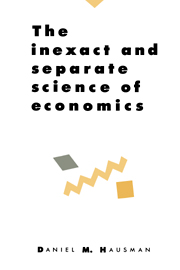Book contents
- Frontmatter
- Contents
- List of figures
- Dedication
- Introduction
- Part I Introduction, structure, and strategy
- Part II Theory assessment
- 8 Inexactness in economic theory
- 9 Methodological revolution
- 10 Karl Popper and falsificationism in economics
- 11 Imre Lakatos and economic methodology
- 12 Economics as an inexact and separate science
- 13 On dogmatism in economics: the case of preference reversals
- Part III Conclusion
- Appendix: An introduction to philosophy of science
- Bibliography
- Index
11 - Imre Lakatos and economic methodology
Published online by Cambridge University Press: 04 August 2010
- Frontmatter
- Contents
- List of figures
- Dedication
- Introduction
- Part I Introduction, structure, and strategy
- Part II Theory assessment
- 8 Inexactness in economic theory
- 9 Methodological revolution
- 10 Karl Popper and falsificationism in economics
- 11 Imre Lakatos and economic methodology
- 12 Economics as an inexact and separate science
- 13 On dogmatism in economics: the case of preference reversals
- Part III Conclusion
- Appendix: An introduction to philosophy of science
- Bibliography
- Index
Summary
Imre Lakatos was a follower of Popper's, but their views came into conflict shortly before Lakatos died. Lakatos' writings on the philosophy of science date from the late 1960s and early 1970s and had no role in the development of the alternative views discussed in chapter 9. Over the last two decades Lakatos has had a tremendous influence, exceeded only by Popper's.
Although Lakatos' views are a brilliant modification of Popper's, they fall prey to the same fundamental difficulties, and this chapter will conclude with some general words of appraisal concerning both Popper's and Lakatos' views. Despite his indebtedness to Popper, Lakatos defends a strikingly original vision of science that has fascinated the leading contemporary writers on economic methodology.
Sophisticated methodological falsificationism
Lakatos grants many of the criticisms I made of Popper in chapter 10, but he thinks them unfair, for Lakatos argues that Popper was moving toward a more sophisticated position to which the criticisms do not apply. Lakatos calls this new position, “sophisticated methodological falsificationism.” One can best grasp what sophisticated methodological falsificationism requires by contrasting its basic three rules of scientific conduct with the three rules of Popper's methodology (pp. 180–1 above).
- Type
- Chapter
- Information
- The Inexact and Separate Science of Economics , pp. 192 - 204Publisher: Cambridge University PressPrint publication year: 1992



